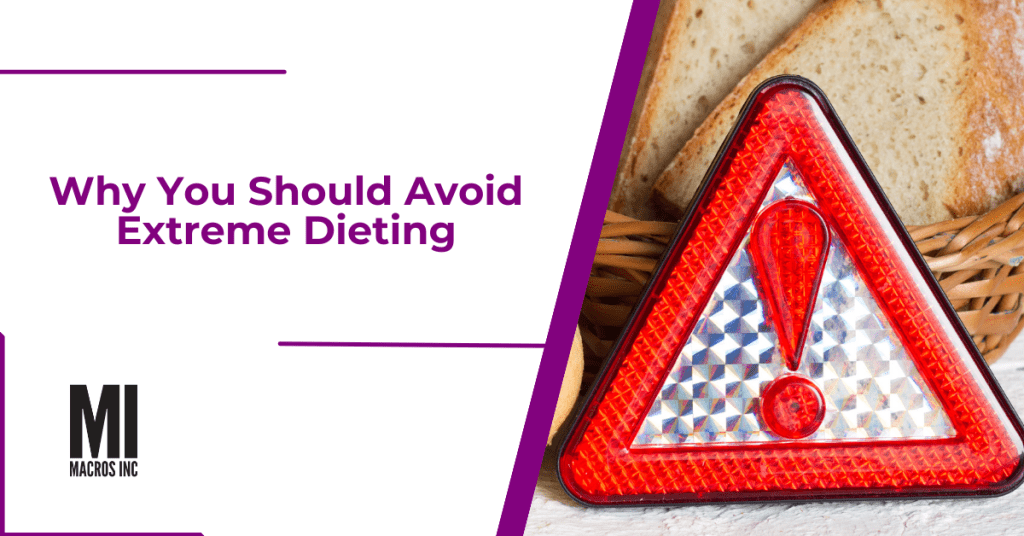The popularity of extreme diets has been on the rise in recent decades, with each new trend pushing the boundaries of restriction further. For example… about 10-15 years ago we had the rise of the Paleo Diet, this eventually lead into ketogenic diets, which lead into the Snake Diet, which lead into the carnivore diet…
These diets often lead to temporary success, followed by plateaus or even adverse health effects.
When you find yourself stuck or facing negative consequences from an extreme diet, it’s time to consider a different approach. In this blog post, we will explore why extreme diets exist, the challenges of transitioning away from them, and the steps to take towards a more balanced and sustainable way of losing weight.
Jump to a Topic
The Cycle of Extreme Diets
Extreme diets tend to follow a pattern of increasing restriction when results plateau. Individuals may start with a moderately restrictive diet and then feel compelled to push further in search of continued progress. This cycle can lead to a dead-end where no further restrictions are possible, leaving individuals at dieting rock bottom.
The Downside of Extreme Diets
Following extreme diets can have negative consequences, both physically and mentally. Some proponents of fad diets have experienced unusual medical conditions, necessitating a change in their approach. This highlights the potential risks associated with extreme restrictions. Stepping back from aggressive restriction is essential to break free from the cycle and find a better path.
The Difficult Transition
Transitioning away from an extreme diet can be challenging, as it requires adjusting your mindset and overcoming immediate discomfort. For example, if you’ve been on a keto or zero-carbohydrate diet, reintroducing carbs can lead to temporary weight gain and changes in digestion. It’s crucial to mentally prepare for these challenges and understand that they are part of the process.
Steps to Take After an Extreme Diet
1. Shift Your Expectations: Embrace a longer-term approach to your health and well-being. Instead of focusing solely on short-term results, aim for sustainable habits and overall wellness.
2. Plan Your Transition: Create a clear plan for transitioning to a more moderate way of eating. Gradually reintroduce foods and adjust your macronutrient ratios to find a balance that suits your body and goals.
3. Solidify Healthy Behaviors: Identify specific behaviors you want to develop as long-term habits, such as portion control, mindful eating, or regular physical activity. Work on incorporating these habits into your new lifestyle.
4. Allow Flexibility and Space: Give yourself permission to be flexible and avoid jumping from one extreme to another. Find a middle ground that allows for enjoyment and variety while still prioritizing nutritious choices.
Sustainable Alternatives to Extreme Dieting
Adopting a balanced and mindful approach to nutrition is key to achieving sustainable health and well-being. Instead of focusing on extreme restrictions, consider incorporating whole foods and a variety of nutrient-dense ingredients into your meals. Emphasize the importance of portion control and mindful eating, listening to your body’s hunger and fullness cues.
Building healthy habits around nutrition and self-care is crucial for long-term success. Find enjoyable forms of physical activity that promote strength, cardiovascular fitness, and flexibility. Remember to strike a balance between exercise and rest, allowing your body time to recover and rejuvenate.
Seeking Professional Guidance
If you’re unsure about the best approach to your nutritional needs, consider consulting with a professional nutrition coach. These professionals can provide personalized guidance and help you develop a well-rounded eating plan that suits your unique requirements and goals.
Additionally, if you have any underlying health issues or concerns, it’s essential to work with healthcare professionals who can address these issues and provide appropriate guidance for your dietary journey. Building a supportive network of experts can empower you to make informed choices and ensure you’re on the right path towards sustainable health.
In Summary
Extreme diets can provide initial success but often lead to plateaus or health complications. When these diets stop working or become unsustainable, it’s crucial to transition to a more balanced and moderate approach.
By understanding the pitfalls of extreme dieting, mentally preparing for the challenges of transition, and following the steps outlined above, you can embark on a healthier and more sustainable path to well-being. Remember, it’s not about short-term fixes; it’s about making long-term lifestyle changes that support your overall health and happiness.
Try our nutrition coaching, for free!
Be the next success story. Over 30,000 have trusted Macros Inc to transform their health.
Simply fill out the form below to start your 14-day risk-free journey. Let's achieve your goals together!


